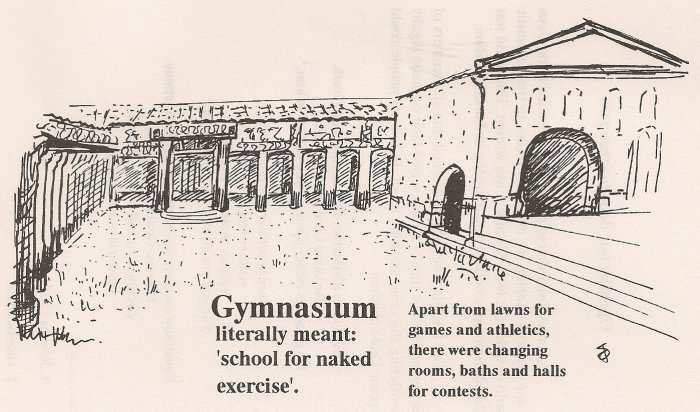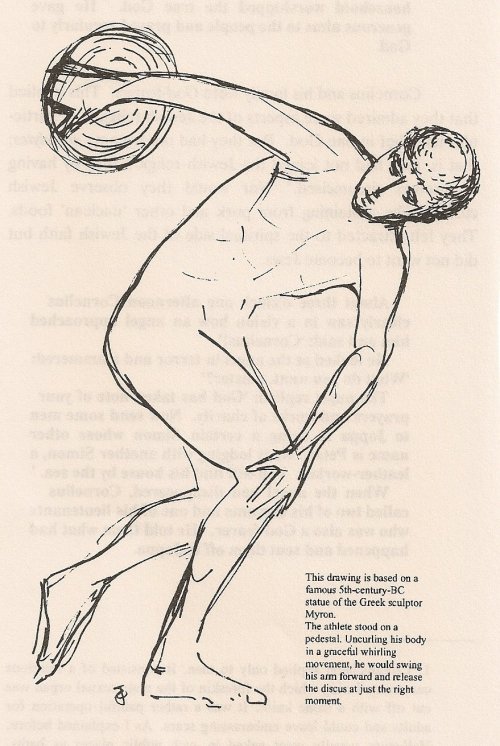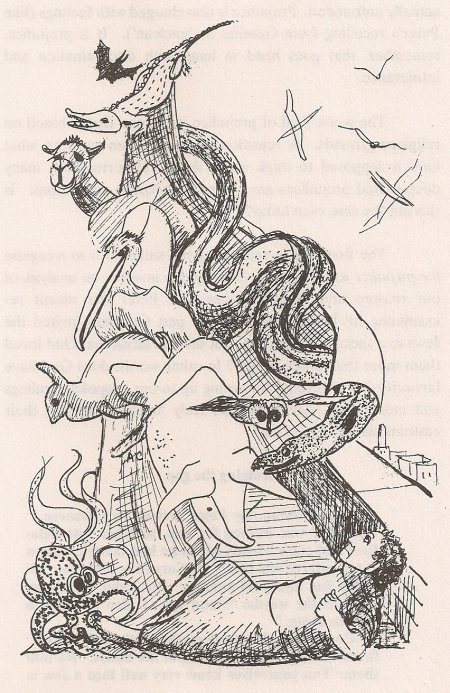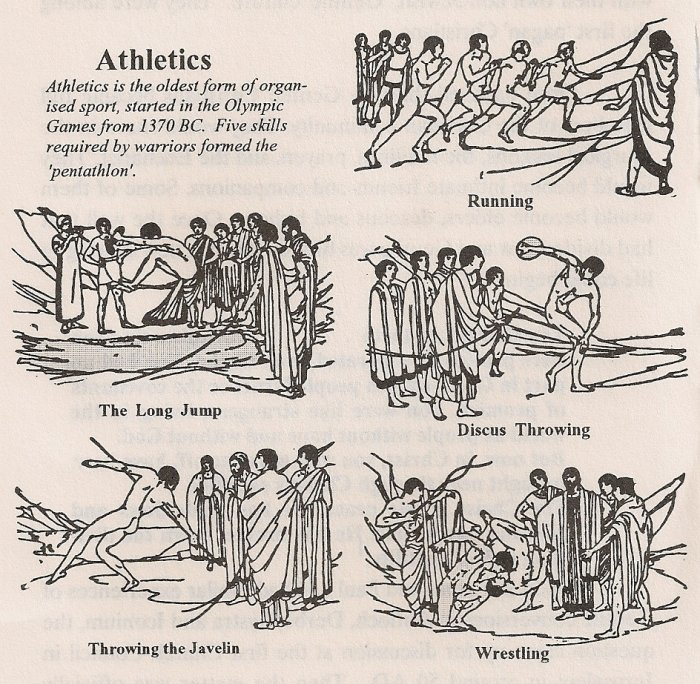
 After our excursion to study the persecution of the Jews in the previous
chapter, we must now return to the hellenistic world in which the New Testament
was written. This world was riddled from top to bottom with prejudice and
discrimination.
After our excursion to study the persecution of the Jews in the previous
chapter, we must now return to the hellenistic world in which the New Testament
was written. This world was riddled from top to bottom with prejudice and
discrimination.
The Christian message proclaimed that all members of the human race are equal. Christ revealed their common dignity by offering the same salvation to all. In him all people could become God's children.
There is no distinction between Jew and Greek.
The same Lord is Lord of all.
He gives his riches upon all who call upon
him. (Romans 10,12. )
There is neither Jew nor Greek,
neither free nor
slave,
neither male nor female.
For you are all one in Christ
Jesus. (Galatians 3,28.)
From now on there are no longer any distinctions
between Gentiles and Jews,
circumcised and uncircumcised,
barbarians
and savages,
slaves and free,
but Christ is all,
Christ is in all.
(1 Colossians 3,11.)
These are beautiful and inspiring texts, but how can they be put into effect? I believe we can do no better than turn to a story in the Acts that concerns precisely the breaking down of prejudice. To grasp the full message of the story invite you to move in spirit to the port of Caesarea that lay on the Mediterranean coast just south of Galilee. (1)
 |
By all contemporary accounts Caesarea was a magnificent city (2). Built by Herod the Great in the time span of 12 years, it possessed grandiose Greek monuments: a marble temple consecrated to Emperor Augustus adorned with splendid statues; a number of palaces; a theatre and an amphitheatre for drama and entertainment; basilicas for business; aquaducts to bring flowing water to the reidential quarters. The city also prided itself on a safe docking area for ships. Its harbour was enclosed by a massive dam constructed of huge slabs of rock. A gymnasium provided opportunity for exercise and sport.
Athletics was the hallmark of Hellenist enjoyment and sense of freedom. The five oldest sports were discus throwing, the long jump, running, wrestling and throwing the javelin. In ancient Greek times these had been skills developed for war. But gradually they had assumed the more general purpose of building up physical fitness.
Hellenists admired the human body. Since the Mediterranean climate is usually warm, it was posssible to exercise without clothes. Even persons belonging to the highest social classes would not feel ashamed to be seen running or wrestling naked.
Traditional, orthodox Jews thought otherwise. They were very upset, in 175 BC, when the Hellenising high priest Jason built a gymnasium in Jerusalem.
'He went so far as to establish a gymnasium at the foot of the Temple fortress and to make the noblest youths wear Greek athletic hats.
Godless crook and unworthy high priest, Jason knew no bounds in his impiety. Indeed, the hellenising process reached such a pitch that the priests showed no interest in the services at the altar.
Ignoring the Temple and neglecting the sacrifices, they would hurry, at the first sign of the chime, to take part in the unlawful exercises in the gymnasium. (2 Maccabees 4,12-14)
 |
The reason for opposing Greek sports lay mainly in the fear that participants would be expected to make votive offerings and so be contaminated with idolatry. Gymnasiums normally were decorated with statues of the god Hermes, envoy of Zeus, who was worshipped as the patron of games and races. In the sun athletes would wear the broad-rimmed hat which Hermes too was reputed to wear when going on his errands. (3)
In Jesus' time it was Herod the Great who built gymnasiums in many cities of Palestine, including one in Caesarea. (4) It was a scandal to orthodox Jews. They would avoid Hellenistic cities as much as they could. And Jesus himself followed this tradition. As far as we know, Jesus never visited Caesarea even though it lay at only half a day's journey from Nazareth. At least no such visit is recorded in the Gospels.
The reason for this is clear. It follows from Jesus' general practice. He focussed his attention on his own people, the Jews, and avoided the Hellenistic cities that had been built among Jewish towns and villages. 'Do not approach pagan territory, nor enter any Samaritan town', he had told his apostles. (Matthew10,5.) When Jesus said 'pagan', he meant 'Hellenist'.
Jesus had preached in Aramaic. All his original disciples were Palestinian Jews. How was the Gospel to escape from its small enclaves in Galilee and Judea to become a world religion? How were age-old prejudices to be broken down? The first communities of Christian converts from Judaism remained practising Jews. Christians joined the Jews in the Temple service, we are told, while breaking the eucharistic bread at home. Left to itself the Church might have remained a closed circle of Jewish believers.
But it was in the town of Caesarea that a breakthrough took place. It may have happened about 15 years after Jesus' death and resurrection. The Acts of the Apostles tells about it in this way:
At Caesarea there lived a man called Cornelius who was a centurion in the so-called Italian Cohort.
A strong Roman presence at Caesarea need not surprise us. The Romans had made Caesarea, and not Jerusalem, the capital of Judea and Samaria. This meant that it was here that the Roman Procurators had their normal residence. And in this city they had stationed the strongest contingent of Roman troops. As centurion, Cornelius was an officer commanding 100 men. The cohort formed a regiment of about 1000.
Cornelius was a religious man. He and all his household worshipped the true God. He gave generous alms to the people and prayed regularly to God.
Cornelius and his family were God-fearers. This implied that they admired some aspects of the Jewish religion, in particular its belief in one God. But they had not become proselytes; that is, they had not joined the Jewish religion fully by having themselves circumcised. (7) Nor would they observe Jewish customs like abstaining from pork and other 'unclean' foods. They felt attracted to the spiritual side of the Jewish faith but did not want to become Jews.
About three o'clock one afternoon Cornelius clearly saw in a vision how an angel approached him and said: 'Cornelius!'.
He looked at the angel in terror and stammered: 'What do you want, master?'
The angel replied: 'God has taken note of your prayers and works of charity. Now send some men to Joppa to bring a certain Simon whose other name is Peter. He is lodging with another Simon, a leather-worker. You will find his house by the sea.'
When the angel had disappeared, Cornelius called two of his servants and one of his lieutenants who was also a God-fearer. He told them what had happened and sent them off to Joppa.
To us it may seem obvious that Cornelius and his family were just the kind of people for whom the Gospel was meant. But this was not so obvious to Jesus' first disciples, all of whom were orthodox Jews. Before anyone could become a Christian, they felt, he or she should first become a Jew. Yes, Christ's salvation was open to all nations, but applicants to the Christian community had first to become proselytes of Judaism.
To the minds of many Jews and Jewish-Christians alike, Gentiles - even good ones like Cornelius - were still dirty and unclean. They were tainted by 'idolatrous' practices, like taking part in hellenistic feasts and eating meat offered in sacrifice. They ate all kinds of animals that had been declared 'unclean' by the Law: pig, hare, eel, octopus and mussels. (8) Their houses were considered unclean because Hellenists at that time buried stillborn babies in their homes.
In short, gentiles were considered 'unclean' as persons. The prophet Ezekiel warns the Israelites: 'Stop the abomination of allowing foreigners, people uncircumcised in heart and flesh, to enter my sanctuary and so profane it'.(9)
Against this background, what welcome would Peter give to Cornelius' emissaries? Would he accept their invitation with open arms?
 |
The next day about noon, while Cornelius' messengers were on their way and coming close to Joppa, Peter went up on the flat roof of the house to pray. He became hungry and had asked for something to eat.
While food was being prepared, Peter fell into a trance. He saw the sky open up and something that looked like a large sheet, held by its four corners, was being let down. In it were all kinds of fourfooted animals, reptiles and wild birds. And he heard a voice say: 'Get up, Peter! Kill and eat!'
'By no means, Lord!' Peter replied. 'Never have I eaten anything defiled or unclean!'
The voice spoke again. 'What God has declared clean, you may not call defiled!'
This happened three times, after which the sheet was pulled back into the sky.
While Peter was pondering in his mind as to what this vision might mean, the men sent by Cornelius located Simon's house and stood in front of the gate. They called out and asked: 'Does some Simon surnamed Peter stay here?'
Peter, still thinking about the vision, heard the Spirit say: 'Listen! There are three men here look- ing for you. Get ready to go down and do not hesi- tate to go along with them, for it was I who sent them.'
So Peter went down and said to the men: 'I am the person you are looking for. Why have you come?'
They answered: 'The centurion Cornelius sent us. He is a good and God-fearing man, highly respected by all the Jewish people. He was instructed by an angel of God to invite you to his home so that he can hear what you have to say.'
So Peter invited them in and put them up for the night. Next day he went on his way with them, accompanied by a group of believers from Joppa.
In this section of the story we have a graphic description of how God made Peter aware of his prejudice. Prejudice, as we have seen, is a rigid attitude we have towards other people based on reasons which we believe to be correct, but which are actually unfounded. Prejudice is also charged with feelings (like Peter's recoiling from Gentiles as 'unclean'). It is prejudice, remember, that goes hand in hand with discrimination and intolerance.
The worst kind of prejudice is the one that is based on religious grounds. A rejection of people then rests on what God is supposed to think about them. Unfortunately, many deep-seated prejudices are rooted in religious convictions. Is this not the case even today?
The first step in remedying the situation is to recognise the prejudice as a prejudice. Usually this involves an analysis of our reasons and rationalisations. For Peter this meant reexamining his belief system. In the past God had invited the Jews to a special relationship. But did this mean that God loved them more than other people? In other words: does God have favourites? It also requires owning up to our unspoken feelings and motivations. Are Hellenists truly 'unclean', or are their customs just strange to me?
The following day Peter arrived in Caesarea. Cornelius was waiting for him, together with relatives and close friends whom he had invited. When Peter entered the doorway, Cornelius met him, fell at his feet and paid homage. But Peter lifted him up with the words: 'Stand up. I also am only a human being.'
Continuing his conversation with him, Peter found many people gathered in the house. He told them: 'You yourselves know very well that a Jew is not allowed to visit a pagan home or associate with pagans. But God has shown me that I should not consider any human being defiled or unclean. So when you called me, I came without objection. I ask you, then, why did you send for me?'
Prejudices are maintained by ignorance. As soon as we cross the threshhold of social distance and come to know other people better, we begin to see how mistaken we are. Overcoming prejudice is a slow process that requires more than changing our ideas. It demands a willingness to break down barriers and adopt new ways of relating to people.
This is what happened to Peter. By getting to know Cornelius and his friends more intimately, he realised how wrong his preconceptions about them had been.
Cornelius replied: 'About this time three days ago, at three in the afternoon, I was praying in my home when suddenly a man in shining clothes stood before me who said: "Cornelius! Your prayer has been heard by God. He has taken notice of your works of charity. Send someone to Joppa to Simon whose other name is Peter. He is staying with Simon the leatherworker who lives by the sea." So I sent for you at once and you have been kind enough to come. Now therefore we are all here in the presence of God, anxious to hear what you have been instructed by him to tell us.'
Peter began to speak as follows. 'Now I realise that it it is true that God has no favourites. He accepts any person who fears him and does what is right, whatever nation he may belong to!'
'God has no favourites'. Peter quoted a scriptural text that describes God as an absolutely impartial judge. Literally the passage says: 'Yahweh your God is God of gods and lord of lords, the great, the mighty and terrible God, who has no favourites and takes no bribe. He enforces justice for the orphan and the widow. He loves foreigners, giving them food and clothing. (10) Peter now understood that God's impartiality as a judge implied impartiality in every respect.
The story in Acts continues with an an account of how Peter proclaimed the Good News about Jesus to Cornelius and his family. They were extremely receptive to his message. In fact, they began to pray exactly as Christians prayed at the time so that the Holy Spirit was visibly at work in them.
While Peter was still speaking, the Holy Spirit came down on all those who were listening to his message. The Jewish believers who had accompanied Peter from Joppa were astonished that the gift of the Holy Spirit had been poured out on these pagans too. For they heard them speak in strange tongues and praising God.
Peter then spoke up. 'Can anyone forbid us to baptise these people with water since they have received the Holy Spirit as we have?'
And he ordered them to be baptised in the name of Jesus Christ.
A momentous breakthrough had been achieved! Peter realised that these good 'gentiles' were as well prepared to become Christians from a spiritual point of view, as any Jews had ever been. So there was no need on him insisting that they first become proselytes by circumcision. They could be given baptism straight away. God had accepted them as they were, with their own non-Jewish, 'Gentile' culture. They were among the first 'pagan' Christians.
Once baptised the new Gentile Christians became full members of the Christian community. They would share in the liturgical sessions, the readings, prayers and the Eucharist. They would become intimate friends and companions. Some of them would become elders, deacons and bishops. Once the wall that had divided Jew and Gentile was broken down, a new sharing of life could begin.
You Gentiles by birth .... remember that you were previously separated from Christ. You had no part in God's chosen people Israel or the covenants of promise. You were like strangers, living in the world as people without hope and without God. But now, in Christ, you who were far off, have been brought near through Christ's sacrifice. For Christ is our peace. He has made Jews and Gentiles one people. He has broken down the dividing wall of hostility.(11)
When Barnabas and Paul had had similar experiences of Gentile conversions in Antioch, Derbe, Lystra and Iconium, the question came up for discussion at the first Church Council in Jerusalem in around 50 AD. Then the matter was officially decided. Non-Jews could be admitted directly to baptism without the obligation of being circumcised or of observing the Hebrew laws. (12)
 |
In the text from Ephesians quoted above, Paul said: 'In Christ you who were far off, have been brought near.' The separation that had been bridged is known as a 'social distance'.
In our ancient past as hunters and primitive farmers, we defended ourselves against enemies mainly by placing a safe distance between them and ourselves. We can still observe this response among tribes in the Amazon. When they come into contact with developers, they will often retreat further into the forest. It is a natural reaction that makes sense in their situation.
In our densely populated countries such a purely physical avoidance is no longer possible. But, following our natural instincts, we can create a distance between ourselves and people we distrust in other ways. We can throw up barriers which the other person will find difficult to cross. We can restrict social contact to a minimum. We can exclude people from our own private space.
In this way we create a social distance that keeps the stranger out of our life.
Since we have relationships with many other groups, we construct an elaborate set of defences around ourselves, which vary depending on the group we are dealing with. We allow some people to approach us more closely than others. Sociologists can measure such varying levels of social distance on a scale. Tolerating someone to live next door to you is easier than allowing someone to marry your daughter.
Suppose you were asked how you would feel about admitting members of a particular group to:
1. close kinship with you by marriage?
2. to your club or circle of personal friends?
3. to your street as neighbours?
4. to employment with you in your profession or job?
5. to citizenship in your country?
6. as visitors to your country?
You would probably find that you would easily admit some groups to the highest levels, while having reservations about others. (13)
It is here that the story of what happened in Caesarea can show us the way forward. If we cannot relate normally to certain groups of people, we have to act. First we should become aware of our prejudices. We should acknowledge our rationalisations and hidden motives. As Christians we should than reaffirm our belief that God has no favourites. If God treats these people as his own children, if they are Christ's brothers and sisters as much as we are, why should we look down on them?
Secondly, we should scrupulously avoid being involved in any form of discrimination. To the extent that lies within our power we should extend to members of the underprivileged group the same support we would give to our own friends; whether this concerns education, health care, social services, jobs, promotion, housing or positions in the parish.
Thirdly, and especially, we should gradually bridge the social distance we have created. We are rightly prudent in selecting our circle of close friends and acquaintances, but this selection may not be based on prejudice. Our prejudices against minority groups will eventually only be overcome when we have close friends and confidants from among that group. It requires on our part a deliberate act of extending our friendship.
It is interesting to look at the story of Lazarus from this perspective. (14) The rich man does not allow Lazarus, the beggar, into his home. When both die, the roles are reversed. Lazarus is Abraham's chief guest in heaven, while the rich man finds himself cut off by a huge abyss. The same will happen to us if we do not open our door to strangers.
1. Think of two persons you know who belong to a minority group. Where do they stand in your regard on the scale of social distance described on page 135?
Do you dare examine your feelings, hidden reasons and true motives?
2. Do you find that minority groups
*are fairly represented in the media?
*are given equal chances in housing?
* are treated on the same footing in job applications?
How can you help change these realities in your part of the world?
3. The international RC Justice and Peace Commission calls for renewed integration in our parishes.
The Church has the sublime vocation of realising the unity of humankind over and above any ethnic, cultural, national, social or other division first of all within herself. By it she signifies precisely that such divisions are now obsolete, having been abolished by the cross of Christ. (The Church and Racism, Rome 1989, no 22.)
Does the above reflect the situation in your local Christian community?
*Would people accept a black pastor?
*Could a member of a minority group be elected president of the parish council?
*Are minorities represented as readers, Mass servers, ministers of communion?
1. There was another town called Caesarea Philippi or Caesarea Paneas that lay north of Galilee on the other side of the Jordan; see Matthew 16,13
2. FLAVIUS JOSEPHUS (37-100 AD), Jewish Antiquities, XV, ix,6.
3. Hellenising Jews who took part in sports were at times ashamed to show themselves naked in public. Some underwent an operation to undo their circumcision, and so betrayed God's covenant; 1 Maccabees 1,15. Other Jews, like Philo of Alexandria, apparently did take part in Greek sports without compromising his religion.
4. FLAVIUS JOSEPHUS, Jewish Antiquities XV, 8,1; 9,6; XII, 6,5; 8,2; The Jewish War II, 21,6.
5. Acts 2,46; see also 3,1.
6. The full text can be read in Acts 10,1 - 11,18. I will present my somewhat free and shortened translation.
7. Circumcision applied only to men. It consisted of a religious ceremony during which the foreskin of the male sexual organ was cut off with a stone knife. It was a rather painful operation for adults and could leave embarassing scars. As I explained before, Hellenists usually went naked in such public places as baths, gymnasiums and sports grounds.
8. Leviticus 11,1-47; Deuteronomy 14,3-21.
9. Ezekiel 44,6-7.
10. Deuteronomy 10,17-18; see also Sirach 35,12.
11. Ephesians 2,11-14; the 'wall of hostility' was a partition that ran around the inner sanctuary of the Temple in Jerusalem and which Gentiles were forbidden to cross under pain of death.
12. Read Acts 15,1-35.
13. E.M.BOGARDUS, Immigration and Race Attitudes, Heath 1928, pp. 13-29. Standard white Americans, for instance, would admit white Englishmen or Canadians to levels 1 and 2, would hesitate about Spaniards, Italians and Jews, and would positively bar Negroes, Chinese and Indians. See also M.BANTON, "Social Distance: a New Appreciation", The Sociological Review, December 1960.
14. Luke 16,19-31.